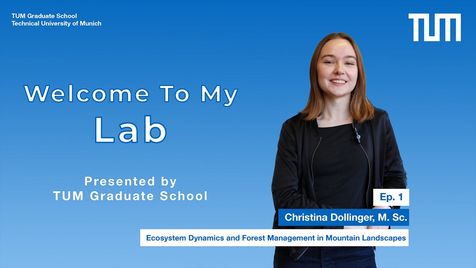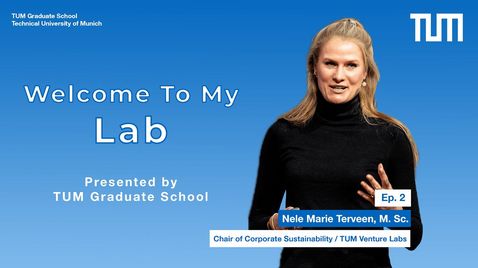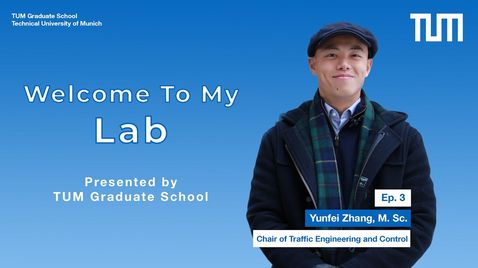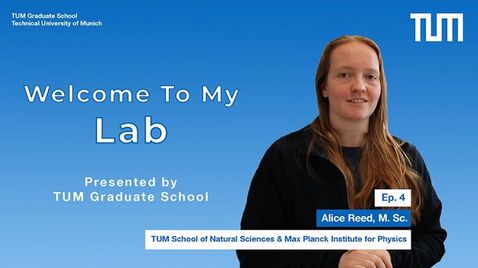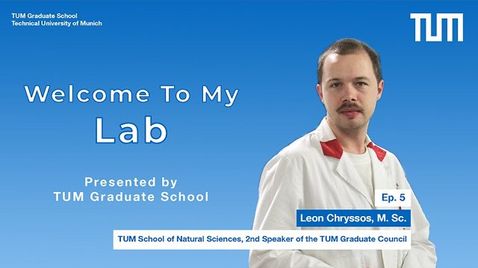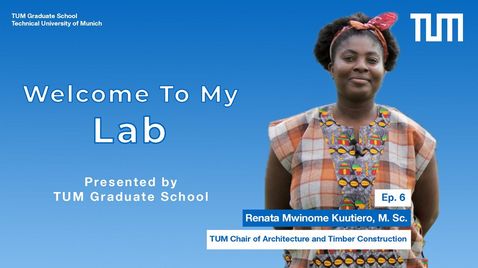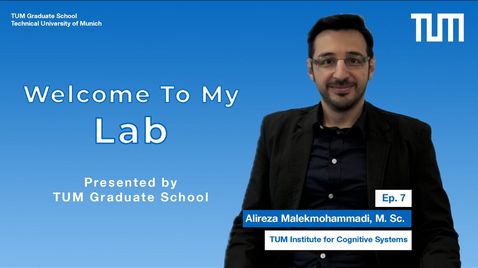"Welcome to my Lab" - Video Series
What does a typical day in the laboratory or office of a doctoral candidate look like? What exactly does their scientific work entail? What kind of impact can their work generate?
A doctorate is a unique experience to be shaped by every single doctoral candidate in their way, and people who are looking to start their own paths to a doctorate can undoubtedly benefit from diverse insights into it. To provide those perspectives and answer your questions, we’re presenting our new video series “Welcome To My Lab”! In each episode, we invite one doctoral candidate to introduce their routine, research, motivations, impacts they aspire to achieve, and suggestions for those who’re considering starting such a career.
Welcome To My Lab - Ep. 1 with Christina Dollinger
Join us for our very first episode featuring Christina Dollinger (M. Sc.) from the Chair of Ecosystem Dynamics and Forest Management in Mountain Landscapes at the TUM School of Life Sciences. The study of #forests is extremely important for protecting the environment and #climate, and Christina explained to us how her work addresses this very issue, which has been a constant source of motivation for her. She also talked about the kind of personal growth she experienced during her journey in academia.
Welcome To My Lab - Ep. 2 with Nele Marie Terveen
For Nele Marie Terveen, a doctoral candidate at the Chair of Corporate Sustainability (TUM School of Management) working for the TUM Venture Labs (Sustainability & Circular Economy), sustainable entrepreneurship emerges as the pathway forward. In the second episode of our Welcome To My Lab series, she articulates how innovation can serve as a catalyst for sustainability, offering solutions to the world's most pressing challenges. She also delves into how her research and the work at the Venture Labs are contributing to this goal.
Welcome To My Lab - Ep. 3 with Yunfei Zhang
For Yunfei Zhang, a doctoral candidate, at the Chair of Traffic Engineering and Control, TUM School of Engineering and Design, autonomous vehicles will play an indispensable role in transport transformation. In the 3rd episode of our Welcome To My Lab series, he not only expands on their contribution to a better public transportation system, but also takes us through his experience of founding a start-up in this field, offering a glimpse into the resources and support Munich and TUM have enabled.
Welcome To My Lab - Ep. 4 with Alice Reed
In the 4th episode of our Welcome To My Lab series, Alice Reed, a doctoral candidate at the TUM School of Natural Sciences and the Max Planck Institute for Physics, talks about her study of the recently discovered #HiggsBoson and her scientific work at the world-famous Large Hadron Collider (LHC) at the CERN, Geneva.
Welcome To My Lab - Ep. 5 with Leon Chryssos
In the 5th episode of our Welcome To My Lab series, Leon Chryssos, a doctoral candidate at the TUM School of Natural Sciences who studies material science, walked us through his research and its impact and application in developing advanced alloys and semiconductors. Moreover, as one of the speakers of the TUM Graduate Council, he also talked about his voluntary work and how he and his colleagues there advocate for the interest of all the doctoral candidates at TUM.
Welcome to my Lab - Ep. 6 with Renata Mwinome Kuutiero
In this episode of our Welcome To My Lab series, Renata Mwinome Kuutiero, a doctoral candidate at the Chair of Architecture and Timber Construction, walked us through her research on how timber can serve as a sustainable supplement to and even replacement for concrete, the challenges of its application in Ghana - her home country, and most importantly, how her research can provide valuable perspectives and solutions to them.
Welcome to My Lab - Ep. 7 with Alireza Malekmohammadi
In the 7th episode of our Welcome To My Lab series, Alireza Malekmohammadi, a doctoral candidate at the Institute for Cognitive Systems with a background of electrical engineering, walked us through his research on how the brain processes auditory signals using tools such as EEG, how he connected his current research with his own field, and his experience working with Prof. Dr. Gordon Cheng, a renowned expert in robotic and neuroscience.
